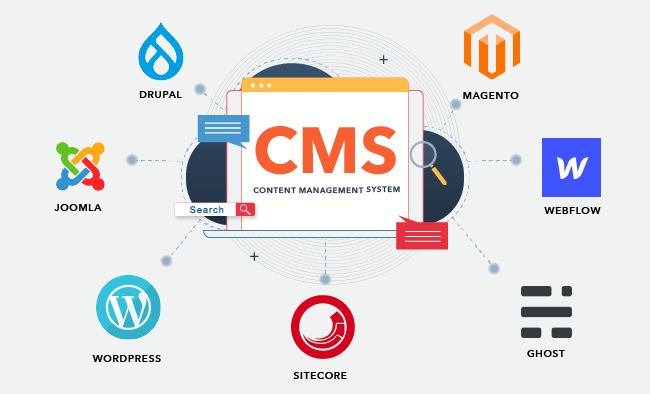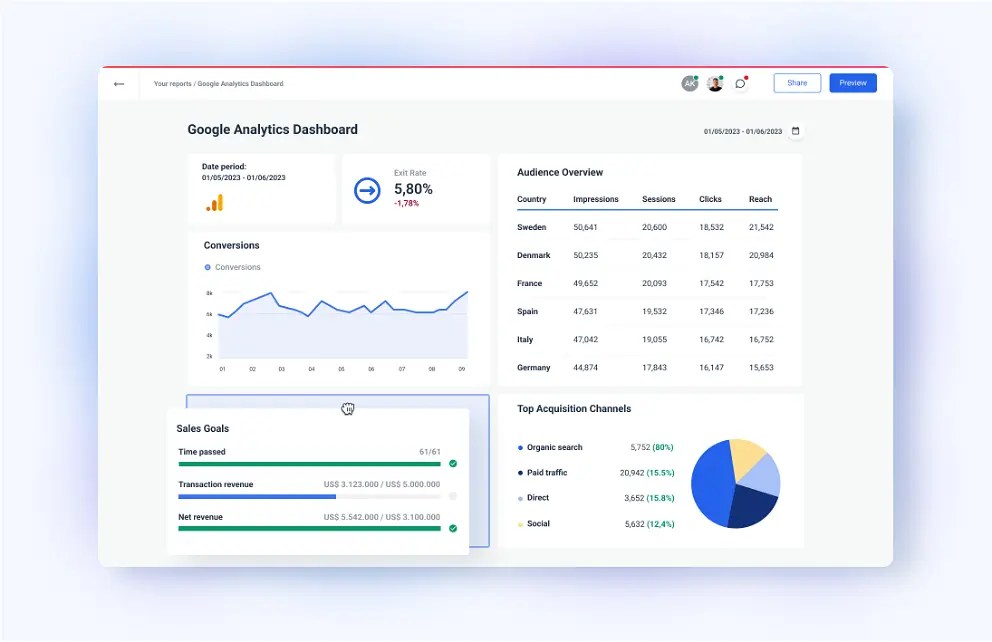Enhanced Content Management
5 Benefits of Having a Website with CMS
In today’s digital landscape, a website is an indispensable tool for businesses and organizations alike. However, simply having a website is not enough; it must be well-maintained and updated regularly to remain effective. This is where a content management system (CMS) comes into play.
A CMS is a software application that allows users to create, edit, and manage website content without the need for technical expertise. By leveraging a CMS, businesses can reap numerous benefits that enhance their online presence and streamline their content management processes. The most popular being WordPress, Joomla and others like Wix, Drupal, Mangeto, SquareSpace and Shopify
1. Simplified Content Creation and Editing:
A CMS provides an intuitive interface that makes it easy for users to create and edit website content. Even individuals with limited technical knowledge can quickly add new pages, blog posts, and other content elements without requiring assistance from a web developer. This empowers businesses to update their website regularly, ensuring that their content remains fresh and relevant.
2. Improved Collaboration and Workflow:
Many CMSs offer collaboration features that allow multiple users to work on the same website simultaneously. This is particularly beneficial for teams where different individuals are responsible for different aspects of the website’s content. By enabling seamless collaboration, CMSs streamline workflow and reduce the risk of errors.
3. Enhanced Search Engine Optimization (SEO):
CMSs often include built-in SEO features that help websites rank higher in search engine results pages (SERPs). These features include tools for optimizing page titles, meta descriptions, and image alt tags. By leveraging these capabilities, businesses can improve their website’s visibility and attract more organic traffic.
4. Mobile Responsiveness:
In an era where mobile devices dominate internet usage, it is crucial to have a website that is responsive and adapts to different screen sizes. Many CMSs offer mobile-friendly templates and themes that ensure that websites display optimally on all devices. This enhances the user experience and reduces bounce rates.
5. Security and Maintenance:
CMSs typically provide robust security features that protect websites from malware, hacking, and other online threats. Additionally, they offer automatic updates and backups, ensuring that websites remain secure and up-to-date with the latest security patches. This reduces the risk of downtime and data loss, providing peace of mind for businesses.
In conclusion, having a website with a CMS offers numerous benefits that enhance content management, improve SEO, and ensure website security. By leveraging the capabilities of a CMS, businesses can streamline their online presence, engage their audience effectively, and achieve their digital marketing goals.
Improved Collaboration
5 Benefits of Having a Website with CMS
In today’s digital landscape, a website is an indispensable tool for businesses of all sizes. However, simply having a website is not enough; it must be well-maintained and updated regularly to remain effective. This is where a content management system (CMS) comes into play. A CMS provides a user-friendly interface that allows non-technical users to easily create, edit, and manage website content.
One of the primary benefits of using a CMS is improved collaboration. With a CMS, multiple users can access and work on the website simultaneously. This is particularly advantageous for teams that are geographically dispersed or have different areas of expertise. For instance, a marketing team can update product descriptions while the IT team focuses on technical maintenance, all within the same platform.
Moreover, a CMS streamlines the content approval process. Instead of relying on email or manual approvals, a CMS allows users to set up automated workflows that route content for review and approval. This ensures that all content is reviewed and approved before it goes live, reducing the risk of errors or inconsistencies.
Another advantage of using a CMS is enhanced security. CMSs typically include built-in security features that protect websites from malicious attacks and data breaches. These features may include regular software updates, user authentication, and data encryption. By leveraging a CMS, businesses can rest assured that their website is secure and protected from unauthorized access.
Furthermore, a CMS can improve website performance and speed. By optimizing content and images, a CMS can reduce page load times and enhance the user experience. This is crucial for businesses that rely on their website to generate leads or sales. A faster website is more likely to engage visitors and encourage them to take desired actions.
Finally, a CMS can provide valuable insights into website performance. Many CMSs offer analytics tools that track website traffic, user behavior, and conversion rates. This data can be used to identify areas for improvement and optimize the website for better results. By leveraging these insights, businesses can make informed decisions about their website strategy and maximize its effectiveness.
In conclusion, having a website with a CMS offers numerous benefits, including improved collaboration, streamlined content approval, enhanced security, improved website performance, and valuable insights into website performance. By leveraging a CMS, businesses can empower their teams, protect their website, and optimize their online presence for success.
Increased Scalability
5 Benefits of Having a Website with CMS
In today’s digital landscape, a website is an indispensable tool for businesses of all sizes. However, simply having a website is not enough; it must be scalable, adaptable, and easy to manage. A Content Management System (CMS) provides these essential capabilities, offering numerous benefits that can enhance your online presence.
1. Increased Scalability:
A CMS allows you to easily add new pages, sections, and content to your website as your business grows. This scalability ensures that your website can accommodate increasing traffic, product offerings, or services without requiring extensive technical expertise or costly redesigns.
2. Enhanced Content Management:
With a CMS, you can manage all your website’s content from a central dashboard. This simplifies the process of creating, editing, and publishing content, empowering non-technical users to make updates without relying on developers.
3. Improved User Experience:
A CMS enables you to create a user-friendly website that is easy to navigate and find information. By organizing content logically and providing intuitive navigation, you can enhance the user experience and increase engagement.
4. Reduced Maintenance Costs:
A CMS automates many website maintenance tasks, such as software updates, security patches, and backups. This reduces the need for manual intervention and lowers the overall cost of maintaining your website.
5. Increased Security:
CMSs are designed with security in mind, providing built-in protection against vulnerabilities and malicious attacks. Regular updates and security patches ensure that your website remains secure and protected from potential threats.
In conclusion, having a website with a CMS offers significant benefits for businesses. Increased scalability, enhanced content management, improved user experience, reduced maintenance costs, and increased security are just a few of the advantages that can help you establish a strong online presence and drive success. By leveraging the power of a CMS, you can create a website that meets the evolving needs of your business and provides a seamless experience for your users.
Enhanced Security
5 Benefits of Having a Website with CMS: Enhanced Security
In today’s digital landscape, website security is paramount. A Content Management System (CMS) plays a crucial role in safeguarding your website from potential threats. Here are five key benefits of using a CMS for enhanced security:
1. Regular Software Updates:
CMS providers regularly release software updates that address security vulnerabilities. By using a CMS, you can ensure that your website is always running on the latest and most secure version of the software. This proactive approach minimizes the risk of exploitation by malicious actors.
2. Built-in Security Features:
Many CMS platforms incorporate built-in security features, such as firewalls, intrusion detection systems, and malware scanners. These features monitor website traffic and identify suspicious activity, providing an additional layer of protection against cyberattacks.
3. User Role Management:
CMS allows you to assign different user roles with varying levels of access to your website. This granular control ensures that only authorized individuals can make changes to sensitive content or settings, reducing the risk of unauthorized access.
4. Data Backup and Recovery:
CMS platforms typically offer data backup and recovery capabilities. In the event of a security breach or hardware failure, you can quickly restore your website to a previous state, minimizing data loss and downtime.
5. Compliance with Security Standards:
Many CMS platforms are designed to comply with industry-recognized security standards, such as ISO 27001 and PCI DSS. This compliance demonstrates your commitment to protecting user data and maintaining a secure website.
By leveraging the security benefits of a CMS, you can significantly reduce the risk of website breaches and protect your valuable data. It is essential to choose a reputable CMS provider that prioritizes security and provides ongoing support to ensure the ongoing protection of your website.
Reduced Costs
5 Benefits of Having a Website with CMS
In today’s digital landscape, a website is an indispensable tool for businesses of all sizes. However, managing a website can be a time-consuming and costly endeavor. A content management system (CMS) can alleviate these challenges, offering numerous benefits that can streamline website management and enhance its effectiveness.
1. Reduced Costs
One of the primary advantages of using a CMS is its ability to reduce website maintenance costs. Traditional websites require manual updates and modifications, which can be both time-consuming and expensive. A CMS, on the other hand, allows users to make changes to their website’s content, design, and functionality without the need for specialized technical knowledge. This eliminates the need for costly web developers or designers, resulting in significant savings over time.
2. Improved Efficiency
A CMS streamlines website management by providing a user-friendly interface that simplifies content creation and editing. Users can easily add, remove, or modify text, images, and other elements without having to navigate complex code. This intuitive design enables non-technical staff to manage the website, freeing up valuable time for other tasks.
3. Enhanced Security
CMSs are designed with security in mind, providing built-in protection against common website vulnerabilities. They regularly receive updates and patches to address potential security threats, ensuring that your website remains secure and protected from malicious attacks.
4. Increased Flexibility
A CMS offers a high degree of flexibility, allowing users to customize their website to meet their specific needs. With a wide range of plugins and extensions available, users can add new features and functionality to their website without having to recode the entire site. This flexibility enables businesses to adapt their website to changing market demands and customer preferences.
5. Improved Search Engine Optimization (SEO)
CMSs are optimized for search engines, making it easier for your website to rank higher in search results. They provide features such as meta tags, keyword optimization, and sitemap generation, which help search engines understand the content and structure of your website. By improving your website’s SEO, you can increase its visibility and attract more organic traffic.
In conclusion, a CMS offers numerous benefits that can enhance the effectiveness and reduce the costs of website management. By providing a user-friendly interface, improved efficiency, enhanced security, increased flexibility, and improved SEO, a CMS empowers businesses to create and maintain a professional and engaging online presence.




